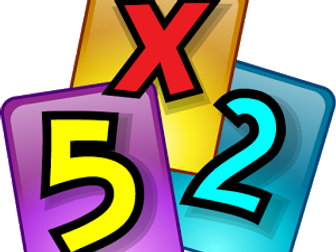Using different coins to make the same amount
Year 2 Interim Framework Working at the expected standard<br />
<br />
The pupil can use different coins to make the same amount (e.g. pupil uses coins to<br />
make 50p in different ways
reading scales in divisions of 1, 2, 5 and 10
Year 2 Interim Framework Expected Standard-all numbers given<br />
Year 2 Interim Framework Greater Depth -numbers not given
undefined
Comparing fractions of amounts
Year 2 Interim Framework Greater depth<br />
<br />
The pupil can find and compare fractions of amounts (e.g. 1/4 of £20 = £5 and<br />
1/2 of £8 = £4 so 1/4 of £20 is greater than 1/2 of £8).
Various activities involving counting in 2s, 5s and 10s
<p>Various activities to cover Year 2 Interim Framework Working towards the expected standard.</p>
<p>The pupil can count in twos, fives and tens from 0 and use counting strategies to<br />
solve problems (e.g. count the number of chairs in a diagram when the chairs are<br />
organised in 7 rows of 5 by counting in fives). unting in fives).</p>
<p>Multistep word problems and reasoning to stretch more able children.</p>
Using the inverse to spot mistakes and identify the missing numbers
Year 2 Interim Framework Expected standard<br />
The pupil can recognise the inverse relationships between addition and subtraction<br />
and use this to check calculations and work out missing number problems<br />
(e.g. Δ − 14 = 28). <br />
<br />
1. Groups of addition and subtraction number sentences for the children to identify and correct the mistakes. <br />
2. Groups of addition and subtraction number sentences for the children to identify the missing numbers.
Counting in 2s, 5s, 10s.
<p>These sheets can be used individually or as the second stage of a whole school multiplication scheme. Pupil and class records, whole school overview, staff information sheet and parent letter included. Includes mastery style missing numbers worksheets.</p>
2x 3x tables worksheets
<p>These sheets can be used individually or as the fifth stage of a whole school multiplication scheme. Pupil and class records, whole school overview, staff information sheet and parent letter included. Includes mastery style missing numbers worksheets.</p>
4x 8x tables worksheets
<p>These sheets can be used individually or as the sixth stage of a whole school multiplication scheme. Pupil and class records, whole school overview, staff information sheet and parent letter included. Includes mastery style missing numbers worksheets.</p>
Various multistep word problems
<p>Written for a Year 2 class.<br />
Problems include all four operations.</p>
Counting up to 5, 10, 20 and 100.
<p>These sheets can be used individually or as the first stage of a whole school multiplication scheme.<br />
Pupil and class records, staff information sheet and parent letter included.</p>
6x 7x 9x tables worksheets
<p>These sheets can be used individually or as the seventh stage of a whole school multiplication scheme. Pupil and class records, whole school overview, staff information sheet and parent letter included. Includes mastery style missing numbers worksheets.</p>
1-12x table worksheets
<p>These resources can be used individually or as the eighth stage of a whole school multiplication scheme. Pupil and class records, whole school overview, staff information sheet and parent letter included. Includes mastery style missing numbers worksheets.</p>
10 x tables worksheets
<p>These sheets can be used individually or as the third stage of a whole school multiplication scheme. Pupil and class records, whole school overview, staff information sheet and parent letter included. Includes mastery style missing numbers worksheets.</p>
5 x tables worksheets
<p>These sheets can be used individually or as the fourth stage of a whole school multiplication scheme. Pupil and class records, whole school overview, staff information sheet and parent letter included. Includes mastery style missing numbers worksheets.</p>
Bundle
Primary School Multiplication Scheme
<p>Starting with counting to 5, 10, 20 then 100, then leading into counting in 2s, 5s and 10s before working sytematically through the multiplication tables as they are found in the Maths Curriculum.</p>
<p>Children work on timed weekly challenge sheets (or can be more often than weekly) and when they have completed four successfully they take a timed assessment.</p>
<p>Designed and created for use in my own school the children love progressing through the levels and seeing themselves succeed.</p>
Comparing number sentences using < > =
Comparing addition of several ones.<br />
Identifying missing numbers to make comparative number sentences correct.<br />
Identifying missing numbers in the context of money to make comparative number sentences correct.
Odd and even numbers: identifying and reasoning
identifying odd and even numbers<br />
sorting them<br />
deciding if statements such as odd+odd=even are true or false etc.
